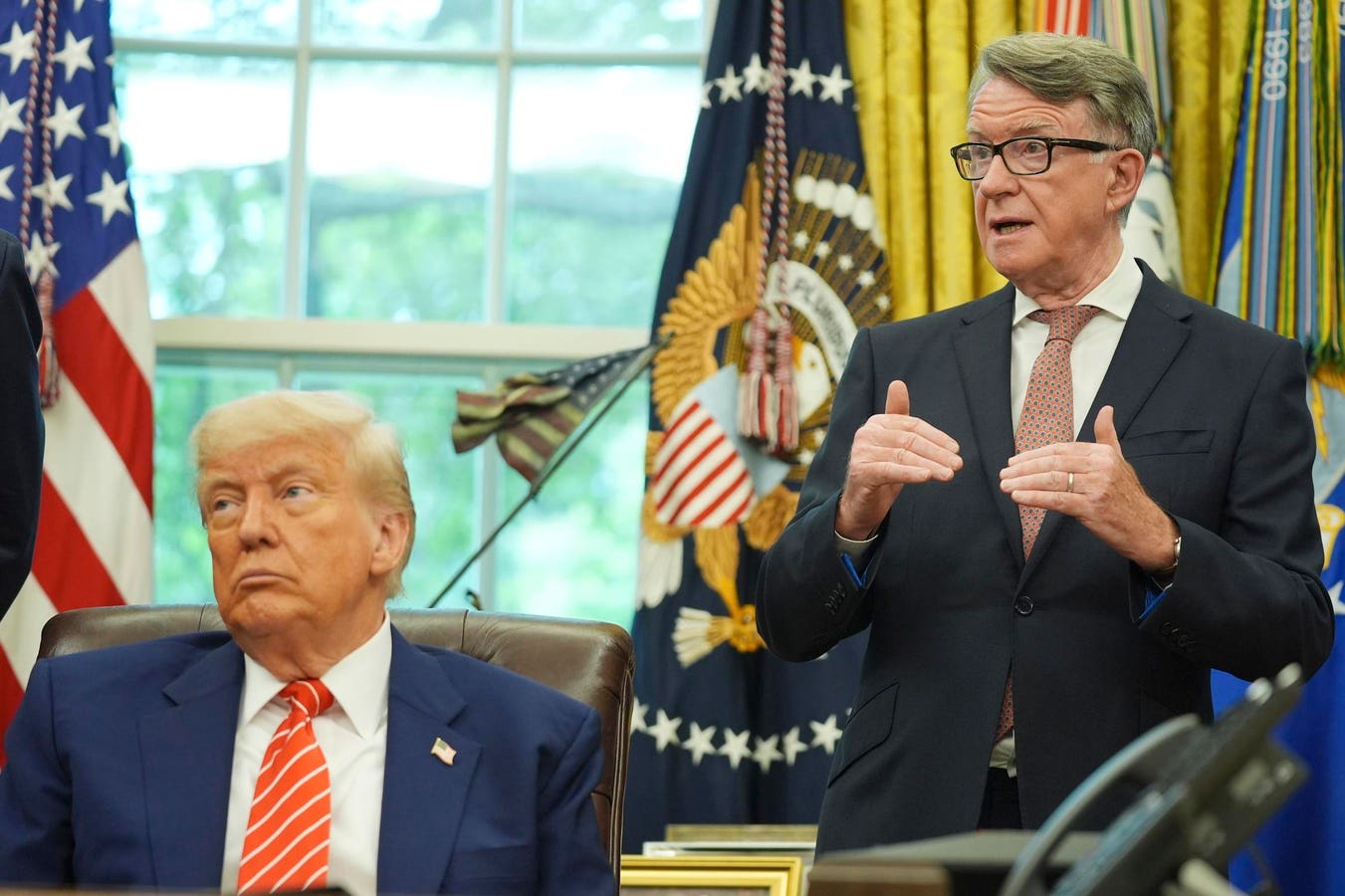Donald Trump listens to Peter Mandelson’s remarks on a trade deal between U.S. and U.K. in the Oval … More
Peter Mandelson, the U.K.’s ambassador to the U.S., hailed a major transatlantic trade deal for automobiles, while expressing effusive praise for President Donald Trump.
Speaking to the Sunday Times, Mandelson pointed out that British autos are currently enjoying a 17.5% competitive advantage over vehicles made in the EU. And such a deal wouldn’t have been possible if the U.K. had remained a part of the European Union.
“We lost many other things by leaving, but we get the chance to do this deal. So there’s some positives,” the ambassador said.
The U.K. reached a trade deal with the U.S. in May that saw tariffs reduced from 27.5% to 10% for the first 100,000 British autos imported each year. The baseline tariff of 10% remains in place for most other imports, and are likely “here to stay,” Mandelson said in the interview, “but there is plenty of scope in different sectors.”
The two nations are continuing their negotiations over reducing steel tariffs, and Mandelson said he’s also pushing for a technology deal.
Mandelson’s appointment as ambassador to the U.S. sparked concerns within the Trump administration over his past meetings with top-level figures in China and the client list of his consultancy, Global Counsel. He had also previously described the president as “a danger to the world” in remarks that he later admitted were “ill-judged and wrong.”
Mandelson told the Sunday Times that Trump is a “more nuanced figure than people appreciate.”
‘Look, he’s not only a unique politician–he’s also going to be one of the most consequential presidents in American history,’ the ambassador said. “He has this sense of history, this grasp of power which I think perhaps recent inhabitants of the White House haven’t quite seen.
“He is not a man for endless seminars and thinking. He’s not a victim of analysis paralysis. He has a very quick, easy way of grasping the core points about an issue. And let’s be honest: more often than not, there’s a kernel of truth in everything he says.”
Mandelson pointed to Trump’s crackdown on immigration as an illustration of this.
“If you take immigration, for example, people feel that the work of ICE [Immigration and Customs Enforcement]
and the policy of deportation is extreme. But what he’s trying to roll back was an extreme opening up of the Mexican border,” the ambassador said.
“Allowing anyone from anywhere in the world to fly in and simply pass into the United States—and fan out across the country without any control or management! The public wouldn’t stand it.”
And Mandelson can see similarities between Trump’s efforts and those of the current Labour government. In May, Prime Minister Keir Starmer announced plans to to “take back control of our borders and close the book on a squalid chapter” of rising inward migration. He outlined how the government plans to introduce restrictions across all forms of visas to stem the flow of people entering the U.K.
In February, the U.S. president accepted an invitation from King Charles for an unprecedented second state visit to the U.K., becoming the first American president to be granted such an honor.
Many pundits regarded the invitation as a savvy move by London aimed at renewing the “special relationship” between the U.K. and the U.S., which Mandelson described as an “economic lifeline built on flows of trade and investment.”
Having arrived in Washington six months ago, Mandelson replaced career-diplomat Karen Pierce, who was known as the “Trump whisperer” for building close ties to the president. Mandelson, a former cabinet minister and Brussels commissioner, said the warm greeting the president gave to him when he first entered the Oval Office was the turning point in his efforts to engage with the Trump administration.
“I’ve never been in a town or a political system that is so dominated by one individual,” he said. “Usually, you’re entering an ecosystem rather than the world of one personality. But he is a phenomenon. A unique politician.”




